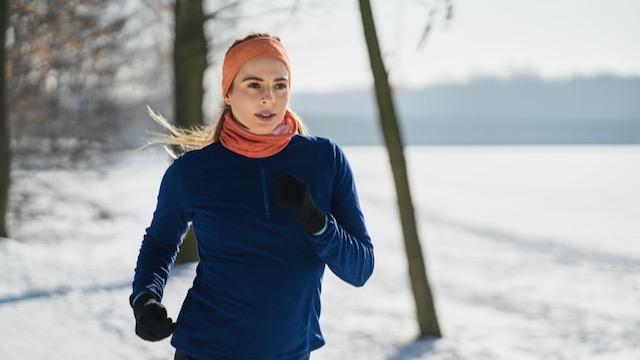How To Look After Your Skin When Exercising Outdoors In Winter
All power to anyone who exercises outside in winter, but if you do then you need to take extra care of your skin

When the weather outside is frightful you need to be made of stern stuff to keep exercising out in it. However, no amount of mental resilience is going to protect your skin from the winter elements during your workouts, so you need to consider your skincare routine.
We spoke to Professor Christian Aldridge, a consultant dermatologist for LifeJacket Skin Protection, to get his advice on how best to look after your skin when exercising outdoors in winter.
What are the problems posed to your skin by exercising outside in winter?
Winter brings drops in temperature and humidity. Those two main elements cause an increased drying of the skin. When the air is very dry, water will leave your skin and then your skin will start to dry. If left and not moisturised, your skin starts to crack, certainly at the peripheries of the body, so the hands and face, tips of the nose and fingers. Then if not treated, it can go on to form a winter dermatitis, which is irritating, red, itchy changes on the surface of the skin. Both the cold weather and the low humidity allow these features to develop.
What causes chilblains?
That’s again caused by temperature. It usually affects the toes and fingertips, and is to do with the fact that the blood vessels there are quite small and vulnerable to temperature changes. With warm temperatures our faces and skin flush, go red, where the blood vessels open up. Conversely, when it’s cold, they will clamp down, so we have very white fingers and toes.
If it’s an extreme case, you can cause a spasm on the blood vessel which interrupts the blood supply to the surface of the skin, hence you get redness and sometimes scaling, crusting, soreness and pain in those digits which are relieved by rewarming. Some people are more prone to that – it can run genetically that you have increased susceptibility.
Is it essential to moisturise after exercising outdoors in winter?
Absolutely. When we get home it’s usually nice and cosy, with the central heating on, which again is the enemy of the skin. That evaporates any remaining moisture out of your skin. Patients with eczema in general get worse in the winter because of the drying effects of central heating.
So have a shower, not too hot, and immediately after you dry, moisturise the skin. Definitely moisturise the bits that have been out and exposed because that improves the suppleness of the skin and allows it to recover.
Get the Coach Newsletter
Sign up for workout ideas, training advice, reviews of the latest gear and more.
Do you need to protect your skin from UV light during the winter?
I think people understand protection from ultraviolet light during the summer, and then during the winter you have more of a measured approach to it. So someone shopping on a rainy December day in a shopping mall doesn’t need sunscreen on their face. But the runner who’s out in all weathers running January to December really could do with additional protection, mainly in the form of a moisturiser with added protection, rather than a high-factor sunscreen on its own. The latter doesn’t make much sense in the winter unless you are in an Alpine resort or you’re skiing where the altitude will increase the UV potency and the white snow reflects UV light even more. Those individuals should use a high-factor sunscreen because your chances of burning are much higher, particularly your face.
So apart from the high-altitude settings, if you’re just running in the winter, then I think something like a daily moisturiser that also has an SPF of 30 is probably ideal for those all-weather runners. The same would apply to sailors and golfers, the people who have chronic exposure. A moisturiser plus an SPF all-in-one also mitigates against photoaging. A lot of ageing effects come with the weathering of the skin.
It’s much more of a tailored approach with winter sun protection. Experts really need to get the message right, otherwise people think we’ve lost the plot! Telling somebody to put sunscreen on in January when it’s snowing outside or it’s freezing and grey, it dilutes the message.
There are some categories and sections of the public who do spend a lot of time outside, who have that chronic exposure who probably benefit from sunscreen – like if you’re an all-weather runner. It adds up, it’s about chronic exposure. So it’s not just that you started doing it this year [so you’re fine]. Years go by and you can accumulate those exposures. You should be using a moisturiser with SPF if you’re out throughout the year, and then moisturising when you come home.

Nick Harris-Fry is a journalist who has been covering health and fitness since 2015. Nick is an avid runner, covering 70-110km a week, which gives him ample opportunity to test a wide range of running shoes and running gear. He is also the chief tester for fitness trackers and running watches, treadmills and exercise bikes, and workout headphones.
